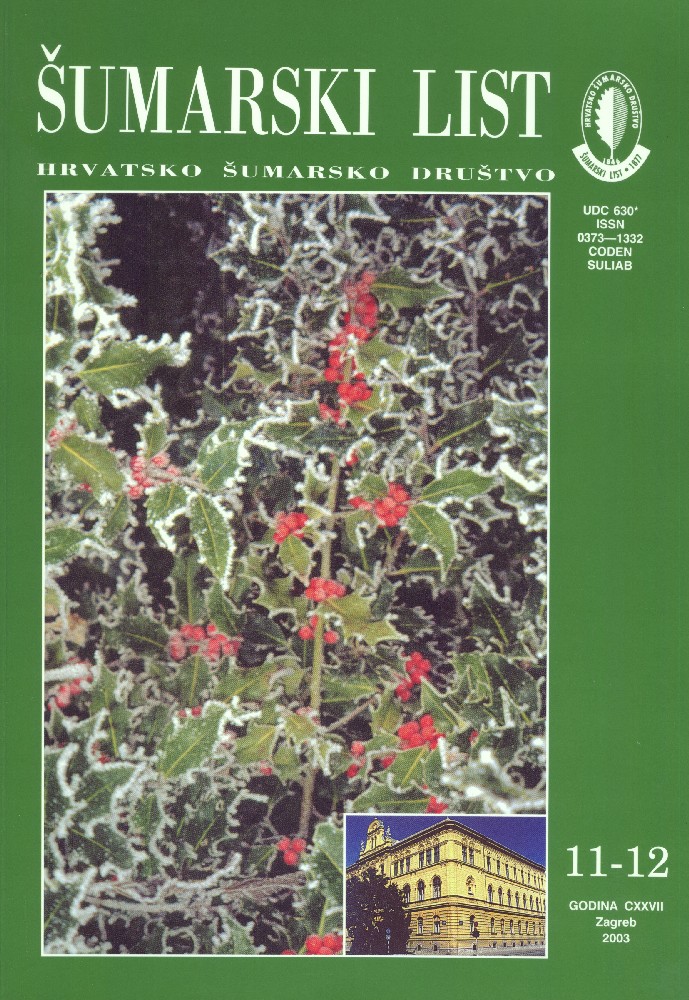
broj: 11-12/2003
pdf (31,0 MB) |
|
||||||||||||||
| IZVORNI ZNANSTVENI ČLANCI | ||
| Vukelić, J., Baričević, D., Drvenkar, D. | UDK 630* 188 (001) | |
| Phytocoenological Characteristics of Beech Forests in Samoborsko Gorje pdf HR EN | 531 | |
| Idžojtić, M., Pernar, R., Kauzlarić, Ž., Abramović, M., Janković, D., Pleše, M. | UDK 630* 442 + 582 (001) | |
| Intensity of Infestation of Silver Fir (Abies alba Mill.) with Mistletoe (Viscum album L. ssp. abietis (Wiesb.) Abrom.) in the Area of the Forest Administration of Delnice pdf HR EN | 545 | |
| Starčević, M. | UDK 630* 423 + 181.3 + 188 (001) | |
| The Effect of Precipitation, Flood and Groundwater on the development of Stands in the Forest Complex “Česma” pdf HR EN | 561 | |
| STRUČNI ČLANCI | ||
| Tomašević, A., Kulić, B., Španjol, Ž., Kružić, T. | UDK 630* 232.4 + 234 + 524 | |
| Development of Black Pine Stands (Pinus Nigra Arn.) and their Ameliorating Role in the Forest District of "Lonja-Biljin", Forest Office Rijeka pdf HR EN | 579 | |
| Božičević, I., Radočaj, M. | UDK 630* 902 | |
| Forestry in the Region of Slunj pdf HR EN | 597 | |
| Domac, J. | UDK 630* 931 + 238 | |
| Energy Sector Legal Framework for the Forest Biomass and the Renewable Energy Utilisation in the European Union and the Republic of Croatia pdf HR EN | 609 | |
| Summary: Developed countries experiences, which successfully conducted biomass use programmes and with significant share of biomass in total energy supply show that a complex and detailed national framework is crucial. Basic parts of that framework are legislation, organization of different institutions participation, defined aims, clear strategy and leaders of each activity, economical aspects and factors analysis as well as stimulating measures definition and implementation. In the past biomass had never taken an important place in the energy policy of the Republic of Croatia. However, the recent changes in the markets of grid-based energy systems, which include privatisation and restructuring of the whole energy sector, are going to significantly affect the possibility of introducing bioenergy and its enhanced utilization. The Croatian energy policy is today directed towards increased efficiency, security of supply and diversification, market deregulation, and the use of renewables and environmental protection. The government launched a number of National Energy Programmes in order to reach the goals of the energy policy, one of which (BIOEN) is directly aimed at biomass and waste utilization. After the ratification of the new energy legislation in July 2001, the last two years were dedicated to the demanding task of elaborating numerous legislative documents, which precisely define all instruments of the state policy as regards bioenergy and other renewable energy sources (RES). Energy Law foresees the elaboration of RES regulations that would define their rights and obligations, price for the energy delivered (feed-in tariffs), as well as other forms of incentive mechanisms. It should be stressed that this Law, for the first time in Croatia, specifically articulates the positive attitude of the Republic of Croatia toward renewable energy sources, thus representing a small but significant shift in view of a positive message to the investors interested. A key step as regards the legislative treatment of RES is also included in the Law on Electricity Market, which establishes the legislative obligation of electric energy purchase generated from renewable energy sources. The quota, i.e. the minimum RES share for the energy entity supplying electric energy as a public service, will be determined by a special direction of the Croatian Government. This paper describes the overall legal framework in Croatia and gives an overview of relevant EC Directives and documents. Key words: legislation; bioenergy; renewables | ||


